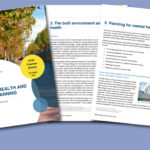The Royal Town Planning Institute (RTPI) has published advice setting out how planners can create healthy communities that promote good mental health.
Mental Health and Town Planning gives advice on how planners can work within the current UK planning systems and with other professionals to take account of mental health when making changes to the built environment.
The advice was published to mark World Mental Health Day 2020 (on the 10th October). The report highlights the importance of building safe homes, encouraging inclusive and connected communities, creating pedestrian friendly places, introducing new green spaces, building housing in well located places and finding solutions to improve environmental quality.
Sarah Lewis, Planning Practice Officer at the RTPI and Author of the report, said: “According to government statistics, mental ill health is the single largest cause of disability in the UK, making up 22.8% of the total health burden, compared to 15.9% for cancer and 16.2% for cardiovascular disease.
“Poor housing is one of the biggest contributors to poor mental health. A good, safe place to live provides an excellent foundation for all other aspects of a mentally healthy life.
“The pandemic has shone a light on how important this issue is, with a large increase in the number of people reporting mental health difficulties. Creating an accessible, inclusive built environment that enables everyone to play an equal role in society is important in protecting and enhancing everyone’s well-being and mental health.”
The advice builds on previous research by the RTPI Enabling Healthy Placemaking that highlights the need for cooperation and collaboration between planning, health and social care professionals in the conceptualisation, design and planning stages of new developments. It summarises expert advice, outlines key planning policy, good practice and case studies.
Several tools, including the Mind the Gaps Framework, the Livewell Development Accreditation, Health Impact Assessments, are also included in the guide.
In England, 20% of homes currently fail to meet the Decent Homes Standard. This standard requires houses to meet the statutory minimum standards of a reasonable state of repair, have reasonably modern facilities and services, and provide a reasonable degree of thermal comfort. In the private sector this figure rises to 25%.
Earlier this year the Ministry for Housing, Communities and Local Government (MHCLG) commissioned research by the University of Liverpool and University College London which found that just 22.1% of dwelling units created through PDR would meet the nationally described space standards, and just 3.5% of the PDR units had access to private amenity space.
Almost 2.7 million people in the UK do not have a publicly accessible local park or green space within a ten minute walk of their own home and poor air quality, noise pollution and climate change all have a detrimental effect on mental health.
The concept of the 20-minute neighbourhood — where individuals are able to meet most of their daily needs (shopping, exercise, education, socialising, health etc) within a 20-minute walk from home — has also gained prominence in terms of promoting good mental health and addressing climate change issues. The Scottish 2020 Programme for Government includes an ambition to work with local government to take forward the concept of 20-minute neighbourhoods. This is backed by £500m over five years for active travel infrastructure projects and the introduction of low emission zones in Scotland’s major cities.









